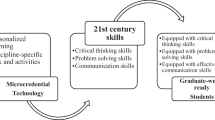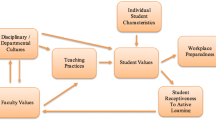Abstract
This paper details efforts by the Purdue School of Engineering and Technology at Indiana University Purdue University Indianapolis (IUPUI) to create a single instrument for honors science, technology, engineering and mathematics (STEM) students wishing to demonstrate competence in the IUPUI Principles of Undergraduate Learning (PUL’s) and Accreditation Board for Engineering and Technology (ABET) Engineering Accreditation Criterion (EAC) and Technology Accreditation Criterion (TAC) 2, a through k. Honors courses in Human Behavior, Ethical Decision-Making, Applied Leadership, International Issues and Leadership Theories and Processes were created along with a specific menu of activities and an assessment rubric based on PUL’s and ABET criteria to evaluate student performance in the aforementioned courses. Students who complete the series of 18 Honors Credit hours are eligible for an Honors Certificate in Leadership Studies from the Department of Organizational Leadership and Supervision. Finally, an accounting of how various university assessment criteria, in this case the IUPUI Principles of Undergraduate Learning, can be linked to ABET outcomes and prove student competence in both, using the aforementioned courses, menu of items, and assessment rubrics; these will be analyzed and discussed.
Similar content being viewed by others
References
Palomba, C.A., & Banta, T.W. (1999) Assessment Essentials: Planning, Implementing and Improving assessment in Higher Education, Josey-Bass Publishers, San Francisco, CA.
U.S. Department of Education. “Secretary’s Procedures and criteria for Recognition of Accrediting Agencies.” Federal Register, 1988, 53(127), 25088–25099.
Ewell, P.T. (1998) “From the States: Statewide Testing: The Sequel.” Assessment Update 10/5: 12–13.
El-Khawas, E. Campus Trends Survey 1995, Higher Education Panel Report No. 85. Washington D.C.: American Council on Education, 1995.
Wankat, P.C. (2004) Analysis of the First Ten Years of The Journal of Engineering Education, Journal of Engineering Education 93/1: 12–21.
Criteria for Accrediting Engineering Program (2002) ABET, Engineering Accreditation Commission: pp. 1–2.
Shirley, D. (2003) “Avoiding Engineering Hubris,” ASEE Prism 12/8: 52.
Catalano, G.D. (2004) “Senior Capstone Design and Ethics: A Bridge to the Professional World. Science and Engineering Ethics 10/2: 409–415.
Newberry, B. (2004) “The Dilemma of Ethics in Engineering Education.” Science and Engineering Ethics 10/2: 343–351.
Harris, C.E. Jr., Davis, M., Pritchard, M.S., & Rabins, M.J. (1996) “Engineering Ethics: What? Why? How? And When? Journal of Engineering Education 85/2: 93–96.
Available: http://www.taualphapi.org/
Available: http://mypage.iu.edu/~mmaglala/cit490/assessment.htm
Gall, M.D., Borg, W.R., & Gall, J.P. (1996) Educational Research. Longman Publishers, White Plains, NY.
McMillan, J.H. (2001) Classroom Assessment: Principles and Practice for Effective Instruction. Allyn-Bacon Publishers, Needham Heights, MA.
Herman, J.L., Aschbacher, P.R., & Winters, L. The National Center for Research in Evaluation, Standards and Student Testing (CRESST). A Practical Guide to Alternative Assessment. Alexandria, VA: ASCD, p. 58. Copyright 1992 by the Regents of the University of California.
Author information
Authors and Affiliations
Corresponding author
Additional information
Timothy Diemer is a visiting assistant professor in the Dept. of Organizational Leadership and Supervision and director of international services in the Purdue School of Engineering and Technology at IUPUI.
Stephen P. Hundley is an Associate Professor of Organizational Leadership and Supervision in the Purdue School of Engineering and Technology at IUPUI.
Robert M. Wolter is a lecturer in the Dept. of Organizational Leadership and Supervision at IUPUI and teaches ‘Human Behavior in Organizations’ and ‘Applied Leadership’.
Rights and permissions
About this article
Cite this article
Feldhaus, C.R., Wolter, R.M., Hundley, S.P. et al. A single instrument: Engineering and engineering technology students demonstrating competence in ethics and professional standards. SCI ENG ETHICS 12, 291–311 (2006). https://doi.org/10.1007/s11948-006-0028-5
Revised:
Accepted:
Issue Date:
DOI: https://doi.org/10.1007/s11948-006-0028-5




